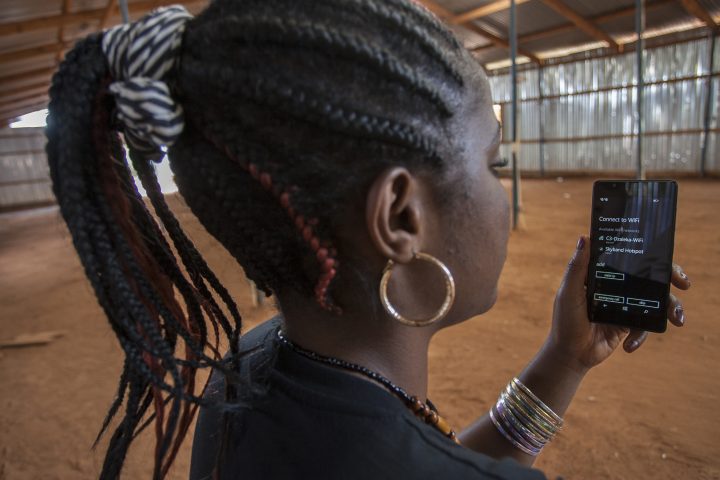By Kelly Clements, Deputy High Commissioner for Refugees at UNHCR and Karl Steinacker, Deputy Director, Division of Programme Support and Management

Siwema Irambona, 21 years old, checks out the network to connect her phone in Dzaleka camp, Malawi © UNHCR/Amos Gumulira
We are living in a revolutionary time. We are all part of the new digital age, both as subjects and as agents of change. In UNHCR, the UN Refugee Agency, we see how digital transformation is reaching communities who were until recently off the grid in every corner of the planet. This is offering people new opportunities, whether it is a group of Somali refugees living in Kenya who earn a living by helping American school children to do their math homework or the Touareg refugee craftsmen in Burkina Faso selling their renowned artifacts and jewelry online to a new global audience.
But this could be just the tip of the iceberg. Imagine a new era where our identity can be stored digitally, where a person who has lost their identity papers in a war zone could now be vouched for. In addition to the traditional methods of interviews and documents review, UNHCR and others could re-establish their identity simply by analyzing their phone and bank account numbers. Many children lack birth certificates which can lead to the denial of their basic rights. But in many cases, their digital records including data on their birth, vaccination and medical history, are most likely stored in health centers and hospitals. Should these records not be used to justify the issuance of identity documents?
Far too often war tears families apart. Digital identities could be a game changer in bringing new solutions to support the claim that individual family members belong together and should be reunited. A secure digital identity would also benefit states as they help in identifying those who are living on their territory.
UNHCR continues to register millions of refugees on behalf of governments all over the world. Refugee IDs are no longer printed on paper but often issued on plastic cards. The next step may be to include a microchip which can be used at ATMs to allow money sent by relatives to be withdrawn, and/or to store the ID card in the cloud, allowing it to be easily presented on a refugee’s smartphone.
The issue of livelihoods is vital for inclusion and the eradication of poverty. In some countries refugees are not allowed to work or open bank accounts. These restrictions are difficult to enforce, however, if somebody works via the internet for a foreign company or opens an online bank account with a bank abroad. The new opportunities offered by globalization have created a space for countries to rethink restrictive legislation. Refugees and other vulnerable people should not be prevented by law from making a decent living, especially when technology allows them to engage in sustainable work.
Technological development and digitalization are essentially global phenomena that profoundly impact all aspects of every society. The scale, scope, and complexity are far-reaching. While some might see a dystopian element to the new digital age, we believe that now is the opportune time to shape the new world where people are empowered and not repressed, and where new solutions can help alleviate both old and modern problems.
To achieve this future, there must be concerted action from governments, the private sector, and the civil society. Together we can help refugees and other displaced persons to thrive thanks to new opportunities provided by the digital era. UNHCR believes in the empowerment of the individual. Online learning and remote access to work and administrative services are already a reality. It is not far-fetched then to imagine that one day, refugees will lodge their asylum claims online, be interviewed over the internet, and receive their asylum decision in a secure message via a block chain key.
The way we protect and assist, support the individual, and help Governments find solutions will also profoundly change. To believe that the ongoing transformation will spare aid agencies would be naïve, perhaps even reckless. A new blog on the UNHCR website, aims to provide a platform where we can continue this discussion. A place for UNHCR colleagues, and also our friends and partners in the NGO community and civil society, governments and international institutions, academia and tech companies, to come together to engage on an exciting journey of exploration and dialogue in order to plan for and effect meaningful change. We also need to consult better with affected populations, discuss the way we will interact in the future, figure out how we guarantee data security and integrity, shape regulatory frameworks that protect the rights of vulnerable people, and ultimately put refugees and other displaced persons on an equal footing with other citizens when it comes to seizing opportunities offered by this new digital age.
“Leaving nobody behind” applies to all countries and sectors of society. Even to digital space.

Beautiful innovation
Don’t forget the Palestinian refugees from restoring their rights
Speaking of digital age, here is a website created by an asylum seeker and and amazing thing is that it provides UNHCR news also along with many free services for asylum seekers and refugees.
https://asylumireland.ml
Do check it out. Digital age is amaizng and the people who are using this to help refugees are more amazing like UNHCR.